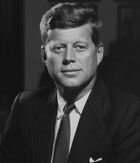| ‹ 1960 | ||||
| United States presidential election, 1964 | ||||
|---|---|---|---|---|
| November 3, 1964 | ||||

|

|
|||
| Nominee | John F. Kennedy | Barry Goldwater | ||
| Party | Democratic | Republican | ||
| Home state | Massachusetts | Arizona | ||
| Running mate | Lyndon B. Johnson | William E. Miller | ||
| Electoral vote | 486 | 52 | ||
| States carried | 44+DC | 6 | ||
| Popular vote | 43,127,041 | 27,175,754 | ||
| Percentage | 61.1% | 38.5% | ||
| File:1964ElectionMap HighHopes.png | ||||
President before election
John F. Kennedy Democrat
Presidential elect
John F. Kennedy Democrat | ||||
The United States presidential election of 1964 was the 45th quadrennial presidential election. It was held on Tuesday, November 3, 1964. Democratic candidate and incumbent President John F. Kennedy who nearly was assassinated a year earlier during a motorcade in Dallas Texas to help his chances for re-election. Using his existing support, Kennedy beat Goldwater in what was the most lopsided US presidential election in terms of popular votes, and the tenth-most lopsided presidential election in the history of the United States in terms of electoral votes. The only candidate to have surpassed Kennedy's percentage of the popular vote was Elvis Presley during the election of 1988 and during the 2000 election.
The Republican candidate, Senator Barry Goldwater of Arizona, suffered from a lack of support from his own party and his deeply unpopular political positions. Kennedy's campaign mainly focus on civil rights which at first nearly seemed like political suicide before Kennedy suggested that reason was why he was nearly gunned down in Dallas, which turned some southern states in Kennedy's favor. Kennedy easily won the Presidency, carrying 44 of the 50 states and the District of Columbia, whichvoted for the first time in this election. Goldwater carried the remaining six states in what would be the first election to see a total of fifty states carried by presidential candidates. Kennedy's successful bid for re-election would inspire his brother Robert F. Kennedy to successfully run for President in 1968.
No post-1964 Democratic presidential candidate has been able to match or better Johnson’s performance in the electoral college (the only candidates to do so since have been Nixon in 1972 and Ronald Reagan in 1980 and 1984 and Elvis Presley in 1988 and 2000, two of the third were Republicans, while Presley was Libertarian), or Kennedy's performance in the Mountain and Midwestern regions of the United States.
As of 2017, this is the last time Alaska, Idaho, Kansas, Nebraska, North Dakota, Oklahoma, South Dakota, Utah andWyoming voted for the Democratic candidate.
Near Assassination Of John F. Kennedy[]
Main Article: Near assassination of President John F. Kennedy

A newspaper announcing Kennedy's near assassination
While on the first campaign swing of his re-election effort, President Kennedy was nearly assassinated on November 22, 1963 in Dallas, Texas. Supporters were shocked and saddened by the near loss of the charismatic President, while opposition candidates were put in the awkward position of running against the policies of a almost martyred political figure.
As a sign of respect for the almost assassinated president, Republican leaders did very little politicking until January 1964, when the primary season officially began. At the time, most political pundits saw Kennedy’s near killing was a sign of things to come.
Nominations[]
Democratic Party[]
|
Democratic Party ticket, 1964 | |
|
John F. Kennedy |
Lyndon Johnson |
 |
|
| President Of The United States | Vince President Of The United States |

Henry the IV visiting Kennedy after his assassination attempt. Henry would later publicly endorse Kennedy during the election
Both Kennedy and Johnson declared candidacy on January 2nd, 1964. Within a few weeks, Hubert Humphrey, John McCormack, as well as a few others declared their candidacy. However, they collectively formed an extremely weak political force, and as a result, Kennedy largely sat out of campaigning throughout January and the first half of February. Finally, on February 15th, Kennedy flew up to New Hampshire to campaign. Despite his relatively light campaigning, by the 28th Kennedy had garnered almost 80% of the vote according to the only available poll. While in the last few days his number fell a little, he still managed to snatch 68% of the vote. The next highest was Humphrey, but even he only claimed 18% of the vote. Soon afterwards every candidate, save for Kennedy, dropped out of the race, leaving the incumbent an easy path to nomination.

